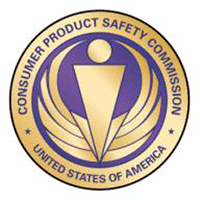Watching the Consumer Watchdog
Air Date: Week of August 10, 2007

Logo for the Consumer Product Safety Commission (Courtesy of CPSC)
A rash of imported children’s toys discovered to be tainted with lead paint has raised questions about how the federal government monitors consumer products. Host Steve Curwood speaks with consumer advocate Don Mays about the Consumer Product Safety Commission.
Transcript
CURWOOD: From the Jennifer and Ted Stanley Studios in Somerville, Massachusetts - this is Living on Earth. I’m Steve Curwood. Caution: Elmo and Big Bird can be harmful to your child’s health. Recently, more than a million toys made in China by Mattel under the Fisher-Price label wound up being shipped to the United States. And despite a voluntary recall by the toy maker, more than 300 thousand toys with toxic lead paint were put in the hands of American consumers. From children’s jewelry to deadly dog food…a rising tide of unsafe products is making its way to the United States. Product Safety Director Don Mays of Consumer’s Union says a good deal of the problem is with the Consumer Products Safety Commission. That’s the federal watchdog agency that’s supposed to monitor product imports.
MAYS: It’s a very small agency with a staff of just over 400. And a budget, an annual budget, of only about 63 and a half million dollars. They have enough staff actually only 15 people that are actually able to work the ports coming into this country. And so you find that they are not able to screen all the products to make sure that they comply with all our regulations. So, they’re a very underfunded, understaffed agency responsible for over 15,000 different types of products. They certainly can’t catch it all they need better funding and better staffing.
CURWOOD: Now, as I understand it, when a whole bunch of popular toys from big bird to Elmo were in fact found to be coated in lead paint the Consumer Product Safety Commission wasn’t even in a position to issue a mandatory recall. What’s going on here?

Fischer Price's Elmo doll (Photo: Nazareno Andrade)
MAYS: Well, actually at the point of that recall the Consumer Product Safety Commission was without a third commissioner, which is required for quorum. Quorum is required in order for them to operate business as usual, which would in fact give them mandatory recall authority. That situation has been temporarily remedied. It was just announced, a bill was just passed that has given, restored full authority to the Consumer Product Safety Commission for the next six months. We worry that by the end of that six months they still won’t have that third commissioner in place and we’ll be back to where we were just last week.
CURWOOD: Don, what’s going on here? Why is it that the Consumer Product Safety Commission doesn’t have a quorum? They have to have a special law passed so that they don’t have a quorum.
MAYS: Well actually they advanced one candidate to become the chairman of the Consumer Products Safety Commission. The fellow, his name was Michael Baroody, and he was working for the National Association of Manufacturers. There were a lot of concerns about conflict of interest issues because he was in fact the head lobbyist for the Manufacturers Association, and in fact he was going to receive a severance package once he left NAM to join CPSC. And a lot of people cried foul and said, “That’s not really right.” As a result he actually withdrew his name and since that time the commission has been operating without any candidates to take the chair position.

Logo for the Consumer Product Safety Commission (Courtesy of CPSC)
MAYS: First of all they have to be given more authority to take action, swift action when it’s necessary. They need to change some of the laws and the statutes by which the Consumer Products Safety Commission operates. They need to give the CPSC more authority to take swifter action. And make sure they’re not let’s say throttled back by some of the regulations that are in place. One such act that we think they should do is that currently the Consumer Products Safety Commission is not allowed to make public anything that is currently under investigation. So, if they are let’s say looking at a concern about lead on toys nobody can discover that until it becomes totally public.
CURWOOD: So, wait a second you’re telling me that Consumer Products Safety Commission starts to investigate something, has probable cause if you will, and is not allowed to tell the public that there is a concern about a product?
MAYS: That’s exactly right. Not until they’re investigation is complete at which point they will take public action on it. If they in fact they decide to take on an investigation and do not take action there’s really no way to find out what the concern was.
CURWOOD: There’s no way for the public to even step forward to either corroborate or contest something like that.
MAYS: That’s exactly right. One of our concerns is that when you look at the problem of contaminated spinach last year, spinach contaminated with E-coli bacteria, the FDA made daily sometimes twice a day announcements about the situation, warning consumers about how wide spread the problem was and what they should be doing. That was valuable information that probably prevented a lot of people from becoming seriously ill and perhaps even protecting some lives. The Consumer Products Safety Commission doesn’t have the same authority to do that. And that is a serious problem because people while they’re doing their investigation, which of course does take some time people are at risk.
CURWOOD: Don Mays is senior director of the Product Safety and Technical Administration of Consumer’s Union. Thank you so much sir.
MAYS: Thank you.
CURWOOD: For more information about consumer product recalls go to our Web site: loe dot o-r-g.
Links
Living on Earth wants to hear from you!
Living on Earth
62 Calef Highway, Suite 212
Lee, NH 03861
Telephone: 617-287-4121
E-mail: comments@loe.org
Newsletter [Click here]
Donate to Living on Earth!
Living on Earth is an independent media program and relies entirely on contributions from listeners and institutions supporting public service. Please donate now to preserve an independent environmental voice.
NewsletterLiving on Earth offers a weekly delivery of the show's rundown to your mailbox. Sign up for our newsletter today!
 Sailors For The Sea: Be the change you want to sea.
Sailors For The Sea: Be the change you want to sea.
 The Grantham Foundation for the Protection of the Environment: Committed to protecting and improving the health of the global environment.
The Grantham Foundation for the Protection of the Environment: Committed to protecting and improving the health of the global environment.
 Contribute to Living on Earth and receive, as our gift to you, an archival print of one of Mark Seth Lender's extraordinary wildlife photographs. Follow the link to see Mark's current collection of photographs.
Contribute to Living on Earth and receive, as our gift to you, an archival print of one of Mark Seth Lender's extraordinary wildlife photographs. Follow the link to see Mark's current collection of photographs.
 Buy a signed copy of Mark Seth Lender's book Smeagull the Seagull & support Living on Earth
Buy a signed copy of Mark Seth Lender's book Smeagull the Seagull & support Living on Earth

